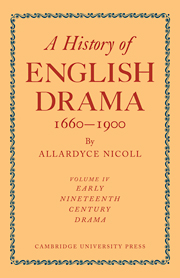Book contents
- Frontmatter
- PREFACE
- Contents
- PART I
- Chapter One THE THEATRE
- Chapter Two THE DRAMATIC CONDITIONS OF THE AGE
- Chapter Three THE ILLEGITIMATE DRAMA
- Chapter Four THE LEGITIMATE DRAMA
- Chapter Five THE STILL-BORN DRAMA
- Chapter Six CONCLUSION
- SUPPLEMENTARY NOTES
- Appendix A THE THEATRES, 1800–1850
- PART II
- SUPPLEMENTARY NÓTES TO THE HAND-LIST OF PLAYS 1800–1850
- INDEX OF PERSONS AND SUBJECTS
Chapter Six - CONCLUSION
Published online by Cambridge University Press: 07 October 2011
- Frontmatter
- PREFACE
- Contents
- PART I
- Chapter One THE THEATRE
- Chapter Two THE DRAMATIC CONDITIONS OF THE AGE
- Chapter Three THE ILLEGITIMATE DRAMA
- Chapter Four THE LEGITIMATE DRAMA
- Chapter Five THE STILL-BORN DRAMA
- Chapter Six CONCLUSION
- SUPPLEMENTARY NOTES
- Appendix A THE THEATRES, 1800–1850
- PART II
- SUPPLEMENTARY NÓTES TO THE HAND-LIST OF PLAYS 1800–1850
- INDEX OF PERSONS AND SUBJECTS
Summary
Outwardly in 1850 the English theatre had reached almost its lowest ebb. The playhouses had been freed, but no startling dawn had sent its rays over the darkness of the dramatic horizon. It might well seem to contemporaries that the London playhouse could never recover, but would always remain a mere adjunct of the Parisian Comédie Francaise, even of the minor theatres of France. Its only real hope seemed to be Shakespeare; its orientation was still towards the Elizabethans and towards such men as Browning who were prepared to turn out poetic dramas.
From our twentieth century pinnacle, however, we can now see that the playhouses of London were but working out their destiny, and that the darkness of 1850 was illuminated by a light cast from the regions despised in those times. The poetic drama had been a natural form in the late sixteenth century; its essentially useful career was continued, so far as tragedy is concerned, up to the period of the Civil Wars. At the Restoration, quite naturally, the thoughts of the dramatists were turned to those models which had been produced in the decades immediately previous to their own times. A glimmering of Elizabethan emotionalism still stirred in the breasts of many, so that an Otway could yet create a passionate Venice Preserv'd, and a Lee, in moments of sanity, could emulate the richness of earlier times. This being so, the poetic drama had a perfect right to live.
- Type
- Chapter
- Information
- A History of English Drama 1660-1900 , pp. 211 - 216Publisher: Cambridge University PressPrint publication year: 1955



